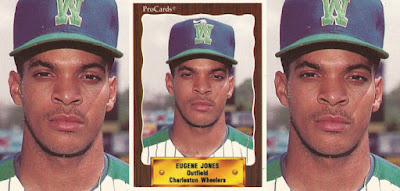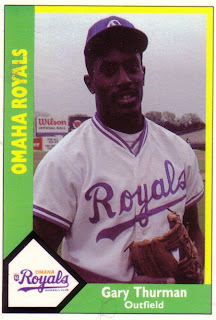G21D Interview Part 4: Lived It
 Rick Lancellotti at his baseball school, talking to a coach who just arrived.
Rick Lancellotti at his baseball school, talking to a coach who just arrived.Part 1: Christmas Morning | Part 2: Moving Up
Part 3: Stunned | Part 4: Lived It | Postscript: How Cool It Was
 Rick Lancellotti saw the writing on the wall. After speaking with Giants brass, they couldn't guarantee him a chance to prove himself in 1987. So he took the offer, from Japan.
Rick Lancellotti saw the writing on the wall. After speaking with Giants brass, they couldn't guarantee him a chance to prove himself in 1987. So he took the offer, from Japan.He did well for the Hiroshima Toyo Carp. But it wasn't where he wanted to be.
"I was so pissed off," Lancellotti recalled to The Greatest 21 Days in a recent sit-down interview at his Buffalo baseball school. "I was like miserable. I sold myself out. I cheated my dream. I was, really, I was not a happy guy.
"I led the league my first year in home runs over there and it didn't mean shit to me," Lancellotti said. "I was like 'whatever.'"
He stayed in Japan for two years, returning to the United States empty. He knew he should have kept going and continued his effort to stick in the major leagues.
But he also felt he was still in good shape and he felt great. He also had one major league stint still ahead of him.
Lancellotti grew up in New England, by buy his return, he was settled in Buffalo with his wife Debbie. Looking for a job, he waited until the Pawtucket Red Sox and Manager Ed Nottle came to town to play his old team the Bisons.
Lancellotti had known Nottle for years and Lancellotti paid a visit to the visiting manager. Pawtucket had gotten off to a bad start, 5-25, Lancellotti recalled.
Lancellotti offered his services, Nottle made some calls and the next day, Lancellotti was in uniform for the AAA affiliate of the Boston Red Sox. "I owe him a lot," Lancellotti recalled of Nottle, "he never should have taken me."
But, along with the signing, came a time limit. At Lancellotti's age, he would have 100 at-bats to prove himself. After that, Nottle couldn't promise anything.
He hit 100 at bats there in 1989, and he was hitting poorly, at .150, Lancellotti recalled. But Nottle kept him on, the young kids on the team needed a veteran around. "He goes, 'nah, there's more to it than .150. Just go out there and play.'"
That next game, Lancellotti recalled, he hit two home runs. He hit 17 on the year.
If Nottle was the one who gave him the chance to play, Lancellotti's next manager at Pawtucket, Johnny Pesky, gave him the change to play in the majors. By July 1990, Nottle was out and Pesky was in as manager.
It was Pesky who recommended Lancellotti get called back up. That also came about the time of Bob Ryan's Boston Globe article on Lancellotti. From Aug. 10 to Aug. 18, 1990, Lancellotti got into his final four major league games. He went 0 for 8.
 A 1991 photo of Lancellotti with Pawtucket, on display at his baseball school. The caption reads "Don't look at the swing + miss. Note how the bat bends - bat speed is generated by keeping hands in."
A 1991 photo of Lancellotti with Pawtucket, on display at his baseball school. The caption reads "Don't look at the swing + miss. Note how the bat bends - bat speed is generated by keeping hands in."Lancellotti played one more year in the minors, in 1991, then went to Italy and played there for 1992, his final professional season.
His playing days over, Lancellotti opened up Rick Lancellotti's Buffalo School of Baseball in 1993, modeled after a friend's school in Las Vegas.
 But, by 1995, Lancellotti was playing again, as a replacement player with the Marlins. He also did what he always did. A bat marking his final professional home run is among the bats on display at his baseball school.
But, by 1995, Lancellotti was playing again, as a replacement player with the Marlins. He also did what he always did. A bat marking his final professional home run is among the bats on display at his baseball school.The reason he went that spring, Lancellotti said, was to speak out for minor leaguer's benefits.
The major league players told the minor leaguers not to play. But they made no effort to help the minor leaguers out, through an organized pension.
Lancellotti believed there was enough money to spread at least some of it to to the minors, to allow the minor league players to get paid a decent amount for playing a professional sport.
A million dollars, spread over 100 minor league players would be $10,000 extra per player, Lancellotti argued.
"You didn't think about it," Lancellotti said, "I didn't care. I wouldn't trade what I did for nothing. I had a blast, and I loved every minute of it. But, you know what? If they would have treated us right, I would have never gone. But I went because I finally get my chance to say something. And I went down there and blasted them."
Lancellotti's efforts were recorded in articles from the time, including one from The South Florida Sun-Sentinel.
Lancellotti recalled a meeting with major league players, with the major leaguers urging the minor leaguers not to play as replacements, and warning of consequences if they did play.
"I go 'You help us and we'll quit,'" Lancellotti recalled telling the union players. "But, you know what? You won't do it.'"
They wouldn't, Lancellotti recalled telling them, because they were too greedy.
Having his say, Lancellotti stuck around until the strike ended and he returned to Buffalo and his baseball school. Just to go to spring training, he'd had to find someone else to run it while he was gone. With that going, he didn't feel he had to try and stay.
 The hallway leading to Lancellotti's baseball school.
The hallway leading to Lancellotti's baseball school.In the years since, Lancellotti has continued with his baseball school, located on Broadway in Depew, NY. The indoor facility is located just south of an Amtrak station and near the Buffalo airport.
Among his students have been his two children Joe and Katie. Joe, 24, played baseball in high school and now works in engineering in Brooklyn. His daughter, Katie, 20, is a junior at Canisius, there on a softball scholarship. He still gets calls from her for advice, especially after a bad game.
As the interview began on this recent Sunday, the baseball school was silent. As it ended, a group of young players had arrived, along with them the sounds of bats hitting balls.
"The biggest thing I bring is the things that I went through," Lancellotti said of teaching his many students over the years. "When you can tell somebody how hard something is, how much dedication you need, ... all the little stuff that is kind of fun to relay back because you lived it.
"It's not something that I've thought about, or thought 'this is how it goes,' " Lancellotti said. "But I actually lived it.
"When you can pass stuff on like that to people, I think it can only help."
Part 1: Christmas Morning | Part 2: Moving Up
Part 3: Stunned | Part 4: Lived It | Postscript: How Cool It Was
Further Reading:
Reading Eagle, Aug. 2, 1979: Buffalo Visit; Three Losses
Gettysburg Times, Associated Press, July 23, 1980: Lancellotti Sparks Buffalo
New York Times, April 7, 1992: Life in the Minors: No Fame or Fortune, Only Diamonds in 7 Countries
South Florida Sun-Sentinel, Feb. 25, 1995: Marlins' Lancellotti Rips Union
Remembering Japanese Baseball: An Oral history of the game, Robert K. Fitts: Rick Lancellotti






